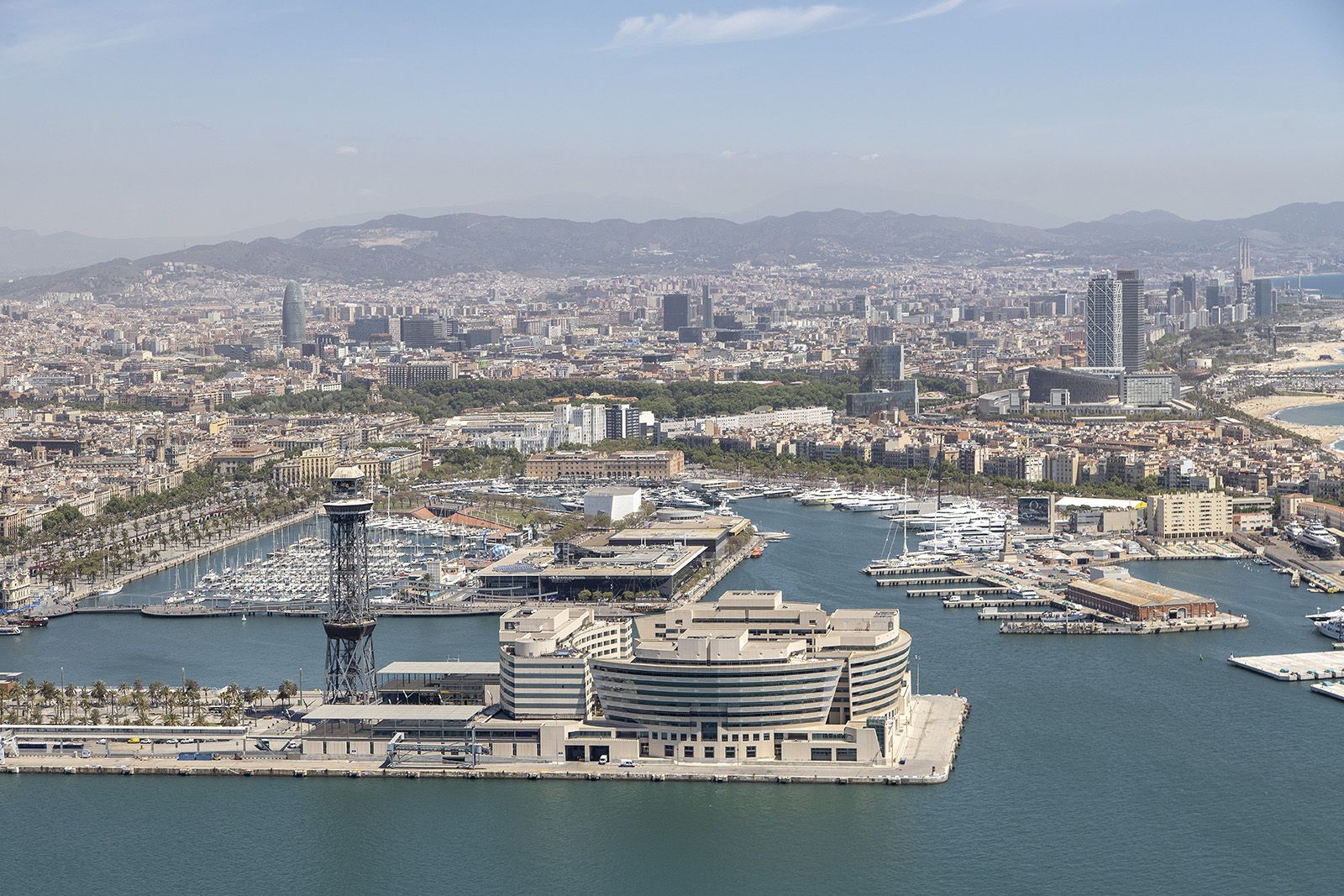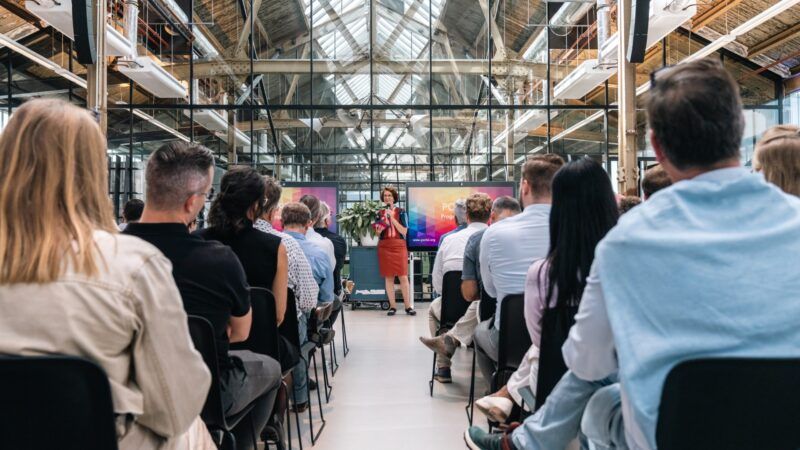 The development of all these programmes will have a multiplier effect, causing startups to target the maritime environment, ports and the blue economy. (GettyImages)
The development of all these programmes will have a multiplier effect, causing startups to target the maritime environment, ports and the blue economy. (GettyImages)
Ports 4.0: a revitalisation of port innovation
The third call of the Ports 4.0 Investment Fund, a real boost for port innovation in Spain, has been announced. Not only because of its support for the start-up ecosystem, but also because it has managed to uplift the ports' interest in innovation.

Alba González is Innovation Projects Technician at the Port de Barcelona.
 The development of all these programmes will have a multiplier effect, causing startups to target the maritime environment, ports and the blue economy. (GettyImages)
The development of all these programmes will have a multiplier effect, causing startups to target the maritime environment, ports and the blue economy. (GettyImages)
Puertos del Estado launched for the first time in 2020 the Ports 4.0 Fund in its idea programme, pre-commercial project and commercial project modalities. The fund aims to actively promote and incorporate disruptive or incremental innovation as an element of competitiveness, efficiency, sustainability, safety and security in the Spanish port-logistics sector. It has had a high level of participation and has allowed different port authorities to develop innovative projects.
As a result of this success, the second call for ideas and commercial projects was launched in October 2021, followed by a third call for pre-commercial projects, which was published on the 10th of March. The new calls have 50% more funding than the original one, which will allow more projects and ideas to be funded.
Ports 4.0 as a catalyst for innovation
Ports 4.0 is a clear driver of innovation in the Spanish port-logistics community. Both port authorities and companies from the ecosystem are committed to promoting projects with new technologies, incorporating innovation activities in their strategic plans and setting objectives that increase their competitiveness through technological and digitalisation change.
Several port authorities, such as Valencia, Barcelona or Bilbao, have already started to develop their innovation hubs with the aim of attracting, fostering and developing an innovative port-logistics ecosystem.
These hubs generate synergies between actors in the port community and with the cities and regions in which they are located, as the following examples demonstrate.

These hubs generate synergies between actors in the port community and with the cities and regions in which they are located, as the following examples demonstrate.
Projects supported by Spanish ports
The Port Authority of the Bay of Algeciras is one of the Spanish ports that most promotes the culture of innovation through its "Innovation Journey". This journey includes programmes such as Algeciras BrainPort which "is conceived as the vehicle axis of the APBA's innovation strategy and covers both the portfolio of innovation projects and the set of activities and actions of a transversal nature in innovation."
The Port Authority of the Bay of Algeciras supports projects such as Posidonia Port CMD, a tool that allows the exchange of information on port calls and vessel operations in real time.
In conjunction with the Valenciaport Foundation, the Port of Valencia announced a few days ago the creation of its Opentop innovation hub. The hub will include an incubation and acceleration programme to be developed together with Telefónica as a strategic partner and a living lab.
In addition, a venture capital fund will be created as part of the hub led by the ValenciaPort Foundation. Opentop has already started its activity by hosting the second edition of the Valenciaport Hackaton which "will try to obtain innovative and creative solutions that improve performance and sustainability in the port of Valencia."
The Perseo project, a platform for monitoring emissions in port areas in real time using SIMAS technology (High Sensitivity Multispectral Imaging System) and the integration of other data sources, has been one of the winners of the first pre-commercial call and has received the support of the Port Authority of Valencia.
At the end of 2021, the Port of Barcelona approved its innovation plan, which establishes its own model based on open and collaborative innovation. The plan defines four lines of work: developing agile and transversal management structures that involve the entire Barcelona port community, establishing alliances with Barcelona's innovative environment, stimulating sectoral innovation and disseminating the port's innovative activity.
Work is already starting on the different lines of action defined. The project for a new innovation hub focused on the blue economy is underway. The Port is increasing the number of pilot tests being carried out at its facilities in order to consolidate itself as a sandbox space.
The launch of the BCN Port Innovation Foundation, a private foundation that will streamline the management of innovative initiatives and collaboration with companies in the maritime port sector, has recently been approved.
Some of the winning projects supported by the Port of Barcelona are CleverVolume, a technological solution that estimates the volume of solid waste by means of a digital replica of the container that calculates the volume and generates a report; or Port OCR Disruption, an intelligent identification software for intermodal transport that identifies any asset anywhere and with any camera.

The new calls for proposals have 50% more funding than the original one, which will allow more projects and ideas to be funded
On the Cantabrian Sea, Bilbao PortLab, created by the Port Authority of Bilbao, seeks to position the Port of Bilbao in the ecosystem of entrepreneurship and innovation. It has recently joined the BAT (B Accelerator Tower).
The Port of Bilbao has been one of the port authorities that has supported the largest number of winning ideas and projects. Some of the projects to be tested in the Bilbao PortLab are Machsens, an artificial intelligence system for the control of diffuse particle emissions; Noiseport, motorisation 4.0 for the evaluation and management of environmental noise; or Owskimmer Project, a solution for the recovery of plastics and hydrocarbons.
A similar model is that of the port of Alicante with Alicante PortLab, an open innovation space that attracts and combines the knowledge and ideas of the different agents of the ecosystem.
The Technological Innovation Node has been created in the port of Huelva, which forms part of the strategic objective of the APH. It will occupy 2,000 square meters on the top floor of the fish market building. It will have different spaces such as a multi-purpose room, incubation area, acceleration area, meeting and conference room. It will be the first port Fiware innovation node in the world, also initiated by Telefónica.
The Port Authority of Huelva supports projects such as Vipe, a tool for monitoring the vulnerability of port infrastructures from space, or Sirena, a platform for detecting and managing security threats, as well as anomalous (suspicious) behavior in IoT ecosystems and infrastructures deployed in ports.
Moreover, in order to encourage the transfer of knowledge between university and business and to promote an innovative ecosystem, the port and the University of Seville are collaborating in the development of the Innovation Center in the Astilleros industrial estate specializing in logistics, industry, materials and sustainability.
In Tarragona, the innovation ecosystem is called Som-Inn Port. It is a collaborative space for the port community created by the Port Authority of Tarragona, together with the surrounding institutions and other stakeholders, which works to introduce innovative techniques in the port's processes, services and business models.
These port authorities, together with the other ports in Spain, support many of the ideas and projects presented in the Ports 4.0 fund to support the development of innovation in their environments.
How and where to apply
The creation of these hubs and the development of all these programmes will have a multiplier effect, causing start-ups currently focused on other sectors such as Industry 4.0 or fintech to set their sights on the maritime environment, ports and the blue economy.
Right now, the third call of Ports 4.0, in the pre-commercial project modality, is already open until 13th of June. It is expected that the fund will announce new calls and continue to contribute to the development of innovation in the Spanish port sector.
With the aim of advising and supporting projects related to the Ports 4.0 fund, the Port of Barcelona provides companies wishing to apply for support from the port authority with an e-mail address ports40@portdebarcelona.cat and a brief guide explaining the fund and how to apply.





